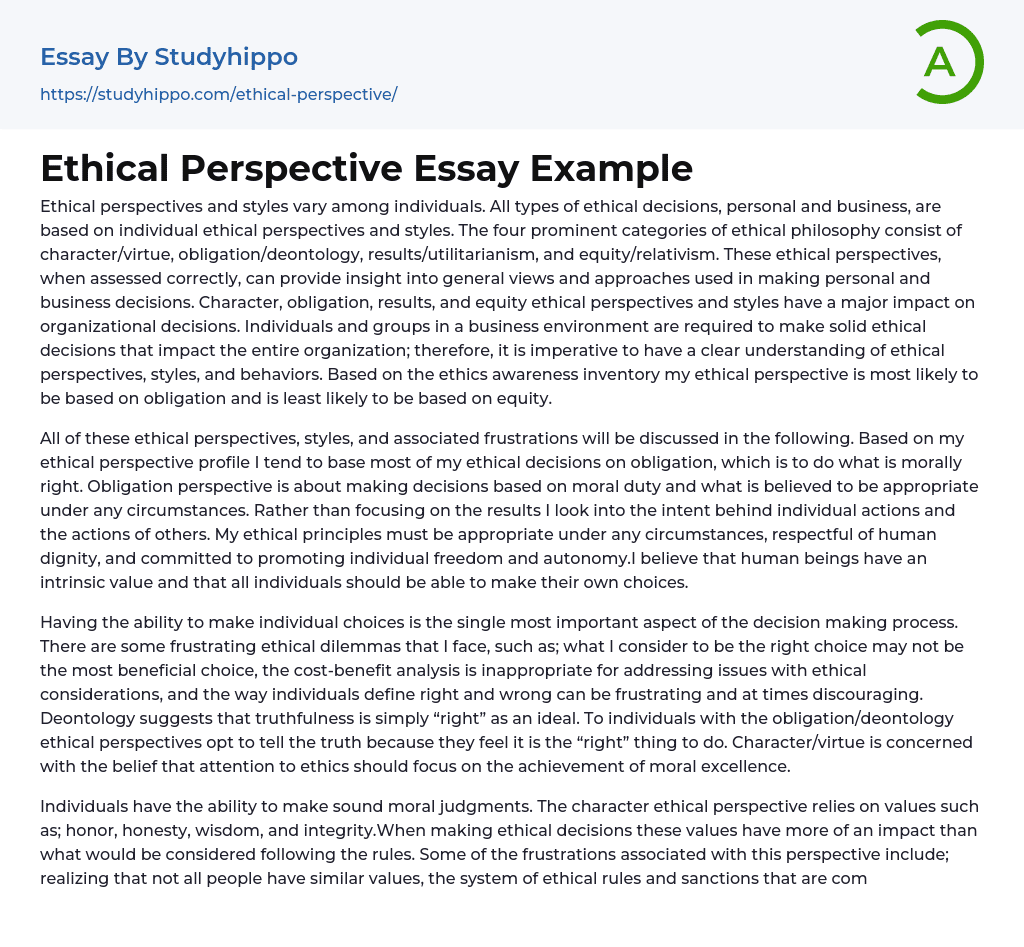Individuals have varying ethical perspectives and styles.
All types of ethical decisions, both personal and business, are influenced by individual perspectives and styles. There are four main categories of ethical philosophy: character/virtue, obligation/deontology, results/utilitarianism, and equity/relativism. These perspectives provide valuable insights into general approaches used in personal and business decision-making. The ethical perspectives of character, obligation, results, and equity have a significant impact on organizational decisions. In a business environment, individuals and groups must make ethical decisions that affect the entire organization. Therefore, it is crucial to understand ethical perspectives, styles, and behaviors. According to the ethics awareness inventory, my ethical perspective is primarily based on obligation and least likely based on equity.
The text delves into various ethical perspectives, including styles and the accompanying frustrations. According to my ethica
...l perspective profile, I strongly lean towards obligation. This implies that I make choices in accordance with what is morally correct. The obligation perspective entails decision-making based on moral duty and appropriateness for each specific situation. Instead of prioritizing outcomes, I evaluate the intention behind individual actions as well as the actions of others.
My ethical principles must be universally applicable, respectful of human dignity, and focused on promoting individual freedom and autonomy. I firmly believe that every person possesses inherent worth and should have the autonomy to make their own choices. The ability for individuals to exercise their personal agency is crucial in the decision-making process. However, there are complex moral dilemmas that I frequently encounter. For example, what I perceive as the right decision may not always be the most advantageous one; when addressing ethical concerns, cost-benefit analysis lacks appropriateness; and differences in people's interpretations of
right and wrong can be disheartening at times.
Deontology asserts that truthfulness is inherently considered "right" as an ideal. Those who follow deontological ethics prioritize honesty because they believe it is morally correct. Conversely, character/virtue ethics emphasizes striving for moral excellence in matters of ethics.
Individuals possess the capacity to form moral judgments. The ethical viewpoint of character bases its foundation on values such as honor, honesty, wisdom, and integrity. These values hold more weight than simply adhering to rules when making ethical choices. Certain frustrations associated with this perspective include acknowledging the disparity in values among individuals, perceiving the artificial nature of commonly used ethical rules and punishments, and understanding that some individuals may lack moral guidance and comprehension of the character ethical perspective. On the other hand, the ethical perspective of results or utilitarianism focuses on the outcomes or consequences of actions. Individuals who endorse this perspective seek tangible evidence in their ethical decision-making process.
The primary concern of individuals with this perspective is solely the "bottom line". The ethical approach connected with this viewpoint entails asserting a moral entitlement to enjoy a prosperous life. This ethical style necessitates the accomplishment of goals. Certain challenges individuals encounter with the results-based ethical perspective encompass potential conflicts with individuals who do not prioritize achieving results, as well as obstacles from others hindering the attainment of desired outcomes. Utilitarianism acknowledges the existence of prioritized competing obligations according to established standards.
The ethical choice, also known as "situational ethics", depends on the situation. If everyone followed the utilitarian standard, humanity as a whole would benefit. The equity/relativism ethical perspective involves having no standards of right and wrong. This challenges rational social
ideals. Individuals make decisions based on practical experience and critical analysis, considering each decision and alternative. This ethical style leads to distrust in institutionalized code of ethics. Individuals with this style may struggle with justifying their ethical decisions to others with different perspectives. In times of crisis, image and short-term benefits often take precedence over ethical decisions.
Relativism is the belief that proper behavior is determined by our social group's expectations. Ethics, which are an individual's moral standards, guide decisions about what is considered "right" or "wrong". Ethical perspectives and styles include various criteria for making choices and decisions, including character, obligation, results, and equity.
Based on my personal ethical awareness inventory assessment, I was identified as an obligation-oriented ethical decision maker. Regardless of our individual ethical perspectives and styles, there are situations where we must determine what we consider to be "right". Hence, it is crucial to have knowledge about ethical practices and establish a process for making ethical decisions. Understanding the four types of ethical perspectives and styles not only impacts the decision maker but also potentially affects everyone involved. The Williams Institute for Ethics and Management proposes that in order to be considered ethical, we must consciously select our actions and the rules we are willing to adhere to.
In the current business environment, it is crucial to prioritize adhering to and abiding by ethical standards within organizations.
- Values of Life essays
- Ethical dilemma essays
- Normative Ethics essays
- Virtue Ethics essays
- Belief essays
- Deontology essays
- Moral essays
- Virtue essays
- Work Ethic essays
- Acceptance essays
- Age Of Enlightenment essays
- Child Observation essays
- Confucianism essays
- Conscience essays
- Critical Reflection essays
- Destiny essays
- Determinism essays
- Empiricism essays
- Environmentalism essays
- Epistemology essays
- Ethics essays
- Ethos essays
- Existence essays
- Existentialism essays
- Fate essays
- Free Will essays
- Functionalism essays
- Future essays
- Good And Evil essays
- Human Nature essays
- Individualism essays
- Meaning Of Life essays
- Metaphysics essays
- Natural Law essays
- Personal Philosophy essays
- Philosophers essays
- Philosophy Of Life essays
- Political Philosophy essays
- Pragmatism essays
- Reality essays
- Relativism essays
- Teaching Philosophy essays
- Time essays
- Transcendentalism essays
- Truth essays
- Utilitarianism essays
- Adult essays
- Aggression essays
- Altruism essays
- Archetype essays




